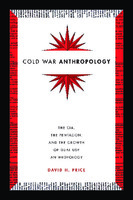Cold War Anthropology
Author(s)
Price, David H.
Collection
Knowledge Unlatched (KU)Number
103399Language
EnglishAbstract
In a wide-ranging and in-depth study of the recent history of anthropology, David Price offers a provocative account of the ways anthropology has been influenced by U.S. imperial projects around the world, and by CIA funding in particular. DUAL USE ANTHROPOLOGY is the third in Price’s trilogy on the history of the discipline of anthropology and its tangled relationship with the American military complex. He argues that anthropologists’ interactions with Cold War military and intelligence agencies shaped mid-century American anthropology and that governmental and private funding of anthropological research programs connected witting and unwitting anthropologists with research of interest to military and intelligence agencies. Price gives careful accounts of CIA interactions with the American Anthropological Association (AAA), the development of post-war area studies programs, and new governmental funding programs articulated with Cold War projects. During the late 1960s and early 1970s, American anthropologists became increasingly critical of anthropologists’ collaborations with military and intelligence agencies, particularly when these interactions contributed to counterinsurgency projects. Awareness of these uses of anthropology led to several public clashes within the AAA, and to the development of the Association’s first ethics code. Price compares this history of anthropological knowledge being used by military and intelligence agencies during the Cold War to post-9/11 projects. This title was made Open Access by libraries from around the world through Knowledge Unlatched.
Keywords
20th century; political activity; history; cold war; science and state; anthropologists; political aspects; military intelligence; united states; anthropologyDOI
10.1215/9780822374381ISBN
9780822374381Publisher
Duke University PressPublisher website
https://www.dukeupress.edu/Publication date and place
Durham, 2016Grantor
Classification
Social and cultural anthropology


 Download
Download Web Shop
Web Shop